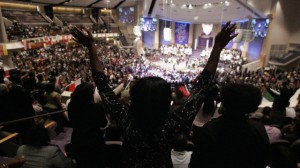Since 1954, tax-exempt religious organizations have been barred from endorsing parties or candidates. FFRF filed their litigation in 2012 in response to conservative preachers openly defying those restrictions. Since 2008, a growing number of clerics have participated in “Pulpit Freedom Sunday,” offering partisan endorsements during services. As ABC News reported in 2010, “The growing trend is a challenge to the IRS from the churches, and may jeopardize their all-important tax-exempt status. But some pastors and church leaders said they are willing to defy the law to defend their right to freedom of speech.”
Most at stake isn’t the freedom to worship or speak out, but eligibility for tax subsidies that are estimated to cost the government over $80 billion in revenues every year. As Dylan Matthews explained in The Washington Post, “Churches don’t pay property taxes on their land or buildings. When they buy stuff, they don’t pay sales taxes. When they sell stuff at a profit, they don’t pay capital gains tax. If they spend less than they take in, they don’t pay corporate income taxes. Priests, ministers, rabbis and the like get ‘parsonage exemptions’ that let them deduct mortgage payments, rent and other living expenses when they’re doing their income taxes. They also are the only group allowed to opt out of Social Security taxes (and benefits).”
According to the FFRF, the IRS “admittedly was not enforcing the restrictions against churches. A prior lawsuit in 2009 required the IRS to designate an appropriate high-ranking official to initiate church tax examinations, but it had apparently failed to do so.” The settlement reached earlier this month is, at least for now, only a symbolic victory for the organization. The IRS has enacted a moratorium on examining tax exempt organizations’ political activities in the wake of the controversy over the agency’s applying extra scrutiny to conservative and liberal “social welfare” organizations.
Nonetheless, as a result of the settlement, the IRS is instituting new protocols “for reviewing, evaluating and determining whether to initiate church investigations.”
Intervening in the case on behalf of Father Patrick Malone, the vicar of Holy Cross Anglican Church in Wisconsin, was the Becket Fund for Religious Liberty. The Becket Fund has gained prominence for its work challenging the Affordable Care Act’s contraception mandate on behalf of Hobby Lobby, and its involvement pushing “religious liberty” exemptions to anti-discrimination laws.



